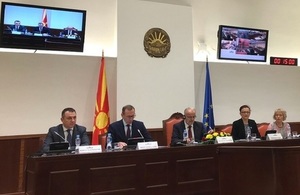Working with Macedonia and partners on intelligence and security reform agenda
British Embassy provides programme support to develop guidelines for parliamentary committees to perform quality oversight of security and intelligence organisations.

British Embassy provides programme support to develop guidelines for parliamentary committees to perform quality oversight of security and intelligence organisations.
The importance to have intelligence and security agencies, which would be accountable to the Parliament in performing their role, was a message underlined by speakers at the conference in Parliament of Macedonia last Friday. The conference was organised to promote new guidelines, which should help the parliamentary committees to inspect the work of the security and intelligence services in Macedonia, a core reform the country has undertaken to strengthen the security sector to protect human rights and fundamental freedoms.
The guidelines were tailored under the auspices of the Geneva Centre for Democratic Control of Armed Forces – DCAF, in cooperation with domestic and international experts and MPs, adjusted to the specifics of Macedonian legislative framework and oversight system.
Our Ambassador Rachel Galloway said:
In the past several years intelligence reforms, intelligence oversight and accountability have been at the centre of the debate on the political crisis in Macedonia. Ensuring effective oversight of security and intelligence services is something that all democracies grapple with – balancing the need for effective security and intelligence organisations with the absolute necessity for oversight to ensure that these organisations are acting as set out in law and their mandates.
The conference was opened by the Speaker Talat Xhaferi as well as the MPs from the Parliament of Macedonia Hari Lokvenec, Trajko Veljanoski and Emil Dimitriev, chairs of the parliamentary committees on defence and security, supervising the work of intelligence agencies, and oversight of the implementation of the special investigation measure interception of communications. Representatives of the DCAF, the Dutch Ambassador to Macedonia Wouter Plomp and EU Delegation Representative Lukas Holub who supported this programme also spoke at the event.
We work with Macedonia on various programmes ranging from reforms in public administration and judiciary, efficiency of Parliament, transparency and accountability of institutions, inclusion and diversity, strengthening civil society and media. You can find more information about our programme work here.
Connect with us on Facebook
Connect with us on @ukinmacedonia
Follow our Ambassador’s work at @RGallowayUK
Read our blogs on UK and Macedonia